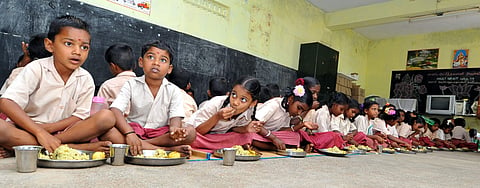

The state government in Karnataka had entered into a Memorandum of Understanding (MoU) with the Akshaya Patra Foundation (APF), a subsidiary of the International Society for Krishna Consciousness (ISKCON), despite the foundation's refusal to use two ingredients — onion and garlic in mid-day meals served to students in government schools. In November 2018, the Department of Primary and Secondary Education had directed the APF to use onion and garlic in food preparations but they had refused to follow recommended nutritional guidelines because it stated that its religious beliefs contradicted the guidelines. Now, the government has yielded to the foundation's demands and backtracked in including the two ingredients.
"Akshaya Patra Foundation refused to include onion and garlic. We could not make alternative arrangements to provide food, and had to yield," an official told The Hindu recently, adding that the issue is yet to be resolved.
According to their website, the foundation has their religious belief which aligns with "advocating a lacto-vegetarian diet, strictly avoiding meat, fish, and eggs" and considers onions and garlic in food as "lower modes of nature which inhibit spiritual advancement." Last year, the National Institute of Nutrition stated that the food provided by APF was in compliance with the nutritional guidelines mandated by the MHRD. However, the Central Food Technological Research Institute (CFTRI) were yet to conduct examinations on the samples of food by APF in order to check if they follow the nutritional guidelines.
This move by the state government has not been well received by public health experts and activists, who feel that they should terminate the contract with the foundation. "The Central Food Technological Research Institute (CFTRI) had done a study in 2015 and they found that onion and garlic increase the bioaccessibility of iron and zinc. Iron deficiency is a huge problem in India, it's almost present among 60 to 80% of children in the country. What's happening everywhere is the pushing of iron tablets. But that can't be a long-term solution to the problem. Also, anything nutritional that can improve the absorption of iron should be given, whether it is onion and garlic — several studies have found them to help increase the absorption and bioavailability," says Sylvia Karpagam, a public health specialist and researcher in Karnataka.
Dr Sylvia feels that not including onion and garlic in mid-day meals is more of a cultural imposition than anything else.
She also feels there's more to the issue of mid-day meals than just onion and garlic. "The more important and larger issue is about the taste of the meals. When children eat food that is tasty they tend to eat more, anyone can understand that we don't need to be researchers or experts to find that out. What's happening with the Akshaya Patra food is it's very bland, it's very monotonous, it's the same thing day in and day out. According to MHRD norms, the lower primary children are supposed to consume food that provides 450 kcal energy and 12 grams of protein, while it will differ based on their age for upper primary classes. The problem is they are consuming way less than what has been asked to provide to them. in Karnataka, the food commission has found that children are eating much less than the mandated or required amount. How do you get children to eat properly? It's all about the taste. It is something very much related to one's habits, what one enjoys at home, you can't have something that is totally different from what the children are used to. It goes against the whole premise of mid-day meals, which is supposed to be relevant," she explains.
According to Ayurveda, our foods are grouped into three categories — sattvic, rajasic and tamasic — in the modes of goodness, passion and ignorance. Onion, garlic and the other alliaceous plants are classified as rajasic and tamasic. As per Hindu texts, garlic, onion and mushroom are prohibited for Brahmins as they are considered to be impure because they generally grow in the place of impurity. Similarly, Jains do not believe in any kind of killing or non-violence. Thus, they do not consume onion and garlic because one has to uproot them from the soil, in the process killing all the germs and microbes present and then consume it.
She explains that the foundation might come up with the argument that it's not just one meal that the children consume in the entire day, they also get their nutrition from the other meals they consume at home. She says this is definitely not the case in point here."The children who come to these govt mid-day meal schools are some of the poorest, who come from the families of labourers, sanitation workers. They are the ones who are most exploited if you see how the labour class is treated in India. Even if they want to give their children all kinds of food, they are not able to. The mid-day meals came in because of all these problems. many children come hungry to the school and therefore they are not able to concentrate, dropout rates are quite closely related. Provision of eggs has also shown to increase attendance in schools. It's a legally mandated right so whether they get to eat at home or not is not the school or the foundation's concern. It is not an argument. By improving the nutritional quality of the meals they can provide what the children require," she states.
Dr Sylvia strongly feels that the government should take a stand and cancel the contract soon. "They should terminate the whole contract. If the contractor doesn't follow the norms or the mandate, the government should not carry it forward with them but cancel it," she concludes.
